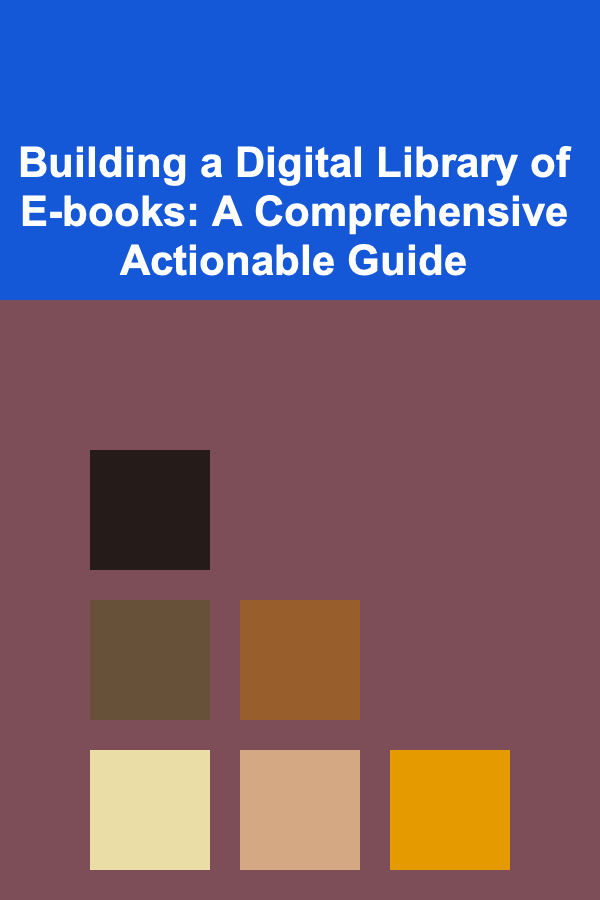
Building a Digital Library of E-books: A Comprehensive Actionable Guide
ebook include PDF & Audio bundle (Micro Guide)
$12.99$7.99
Limited Time Offer! Order within the next:

In the age of digital information, e-books have revolutionized the way we consume literature, research materials, and educational resources. Whether you're a book enthusiast, a student, or a professional in need of quick access to information, a well-organized digital library can be an invaluable tool. This guide will walk you through the process of building a personal digital library of e-books, covering everything from organization to management, and security.
Understanding the Importance of a Digital Library
A digital library of e-books is more than just a collection of files. It is a centralized, organized system that allows for easy access to a wide range of materials. The benefits include:
- Portability: You can carry thousands of books in your pocket, whether on an e-reader, tablet, or computer.
- Searchability: Finding specific information or references is a breeze with digital books, thanks to built-in search features.
- Organization: Unlike physical books, e-books can be categorized, tagged, and organized in various ways to suit your needs.
- Space-saving: A digital library doesn't take up physical space, and there's no need to worry about shelf space or clutter.
Building a well-curated and organized digital library can dramatically enhance your reading and research experience, providing easy access to content when you need it most.
Choose the Right E-book Formats and Software
Before you begin acquiring e-books, it's crucial to understand the different e-book formats and the software needed to access them. E-books come in a variety of formats, and choosing the right one will depend on the device you use to read them and the specific features you want.
Common E-book Formats
- EPUB: One of the most popular and widely supported e-book formats. It is supported by most e-readers except for Amazon's Kindle. EPUB is ideal for most devices and allows for reflowable text, which adjusts to your screen size.
- MOBI: The native format for Amazon's Kindle devices. While Kindle supports EPUB files through conversion, MOBI is typically the best format for Kindle users.
- PDF: A widely-used format that preserves the layout and design of the original document. While PDFs are excellent for reference books and textbooks, they're not ideal for e-readers as they don't adapt to different screen sizes well.
- AZW3: Amazon's proprietary e-book format for Kindle devices. It's similar to MOBI but includes advanced features like annotations and bookmarks.
- TXT and HTML: Basic text formats that are often used for simple documents, but they don't support rich formatting like EPUB or MOBI.
E-book Management Software
Choosing the right software to manage your digital library is key to keeping everything organized and accessible. Here are some popular tools:
- Calibre: A powerful, open-source e-book management software that allows you to organize, convert, and even edit e-books. It supports a variety of formats like EPUB, MOBI, and PDF.
- Adobe Digital Editions: Ideal for managing EPUB and PDF books. It's often used for DRM-protected books but lacks some of the conversion and organizational features that Calibre offers.
- Amazon Kindle: While primarily for Kindle users, the Kindle app also allows you to read books on devices other than Amazon's e-readers. Kindle Cloud Reader and Kindle for PC/Mac are useful for accessing your e-books across multiple platforms.
- Google Books: Google's platform also allows you to store and access your e-books, including purchases from the Google Play Store. It syncs across devices and can store your books in the cloud.
Choosing the Right Device
While smartphones, tablets, and laptops can all be used for reading e-books, choosing a dedicated e-reader can enhance your experience. Popular options include:
- Amazon Kindle: Known for its paper-like display, the Kindle is ideal for long reading sessions.
- Kobo eReader: An alternative to Kindle with better support for EPUB files.
- Onyx Boox: Offers Android-based e-readers with excellent file format support, including EPUB, PDF, and MOBI.
Once you've selected the software and hardware that best fit your needs, it's time to begin curating your collection.
Acquiring E-books for Your Digital Library
Building a digital library requires the acquisition of e-books, and there are several ways to legally obtain digital copies of books.
1. Purchase E-books
- Amazon Kindle Store: Amazon's Kindle Store is the largest online marketplace for e-books, with millions of titles available for purchase in MOBI and AZW3 formats.
- Google Play Books: Google's marketplace offers a wide selection of e-books in EPUB and PDF formats, available for purchase or rent.
- Barnes & Noble: Their Nook store has a large library of e-books in EPUB format, although it is region-restricted in some areas.
- Apple Books: Apple's bookstore offers a range of e-books for iOS and macOS devices, with a heavy emphasis on bestsellers and contemporary literature.
2. Public Domain E-books
There are many websites that offer free e-books from public domain sources. Some of the most notable include:
- Project Gutenberg: A vast collection of over 60,000 free e-books, mostly classic literature, in EPUB, Kindle, HTML, and plain text formats.
- Internet Archive: A digital library that includes millions of free books, films, music, and more.
- Google Books: Offers access to many public domain books in full view.
3. Subscription-Based Services
- Kindle Unlimited: A subscription service offered by Amazon, allowing you to borrow and read e-books, audiobooks, and magazines from a vast library.
- Scribd: Provides unlimited access to e-books, audiobooks, and other content for a monthly fee.
- BookBub: While not a subscription service, BookBub offers daily deals on discounted and free e-books, which can be added to your library.
4. Library Services
Many local libraries offer free e-books through services such as:
- OverDrive: A free library service that allows you to borrow e-books and audiobooks through your library.
- Libby: A mobile app for borrowing e-books from libraries that partner with OverDrive.
Organizing and Categorizing Your Digital Library
An organized library is essential for quick access to your e-books. Here are strategies for managing your collection:
1. Folder System
- By Genre: Create folders for genres like Fiction, Non-fiction, Science, Fantasy, History, etc.
- By Author: Organize your collection by author's last name.
- By Series: If you have books in a series, keep them in subfolders according to the series name and number.
2. Tagging and Metadata
Many e-book management tools like Calibre allow you to add tags to each e-book. Tags can be used to:
- Mark unread books
- Track books you're currently reading
- Categorize by topics like "self-help," "business," "fiction," etc.
Additionally, Calibre allows you to edit the metadata of an e-book, including the title, author, and cover image. Properly managing metadata ensures your books are easy to find and categorize.
3. Backing Up Your Library
As your library grows, it's essential to have backups. E-books can be easily lost due to accidental deletions or device failures, so ensure you store backups in multiple locations:
- Cloud Storage: Use services like Google Drive, Dropbox, or OneDrive to back up your library.
- External Drives: Store copies of your e-books on external hard drives or SSDs for extra protection.
- Physical Backup: You can also use physical media, such as USB drives, to back up your library.
Securing Your Digital Library
Security is an often-overlooked aspect of digital libraries. Protecting your files and ensuring that your e-books are safe from piracy or accidental deletion is crucial.
1. Use DRM-Free E-books When Possible
Digital Rights Management (DRM) is used to protect e-books from unauthorized distribution, but it can also restrict how you use and transfer the books. When possible, try to choose DRM-free e-books so you can back them up and use them across multiple devices without restrictions.
2. Enable Encryption
When storing sensitive e-books, it's a good practice to encrypt the files or use password-protected folders. This ensures that even if someone gains access to your storage device, they won't be able to view or misuse your library.
3. Avoid Pirated E-books
While it may be tempting to download free e-books from unauthorized sources, pirated content is not only illegal but often comes with risks, including malware. Stick to legitimate sources for your e-books to ensure that you're reading safely and legally.
Maintaining Your Digital Library
Building your digital library is just the beginning. To maintain it, you should:
- Regularly update and expand your collection by acquiring new titles.
- Continuously organize and clean up any clutter or outdated files.
- Keep track of any new additions to ensure your library stays up-to-date.
Conclusion
Building a digital library of e-books allows for convenient, portable, and organized access to an extensive collection of reading materials. By selecting the right formats, software, and acquisition methods, you can create a digital space that reflects your interests and needs. With thoughtful organization and careful management, your e-book library will become an invaluable resource for both reading and research.
Reading More From Our Other Websites
- [Biking 101] Bike Locks: How to Protect Your Bike from Theft
- [Scrapbooking Tip 101] Must-Have Supplies for First-Time Scrapbookers
- [Personal Care Tips 101] How to Find a Workout Buddy to Stay Motivated
- [Paragliding Tip 101] Top & Common Paragliding Insurance Claims and How to Avoid Them
- [Organization Tip 101] How to Set Up a Minimalist Bedroom for Better Sleep
- [Home Budget Decorating 101] How to Decorate Your Home for Spring with Budget-Friendly Ideas
- [Star Gazing Tip 101] How Moon Phases Influence Tides, Wildlife, and Human Culture
- [Gardening 101] DIY Diagnosis Lab: Using Simple Tools to Test and Confirm Garden Diseases
- [Organization Tip 101] How to Organize Personal Documents for Peace of Mind
- [Gardening 101] Designing a Beautiful Xeriscape: Plant Choices and Layout Tips

How to Get High-End Decor Looks for Less
Read More
How to Organize Your Home Gym for Maximum Motivation
Read More
How To Reduce Your Consumption of Palm Oil for Wildlife
Read More
How to Stage Your Home for Different Buyer Demographics
Read More
How to Master the Evolving Social Media Landscape
Read More
Simplifying Your Health and Wellness Regimen: A Holistic Guide
Read MoreOther Products

How to Get High-End Decor Looks for Less
Read More
How to Organize Your Home Gym for Maximum Motivation
Read More
How To Reduce Your Consumption of Palm Oil for Wildlife
Read More
How to Stage Your Home for Different Buyer Demographics
Read More
How to Master the Evolving Social Media Landscape
Read More